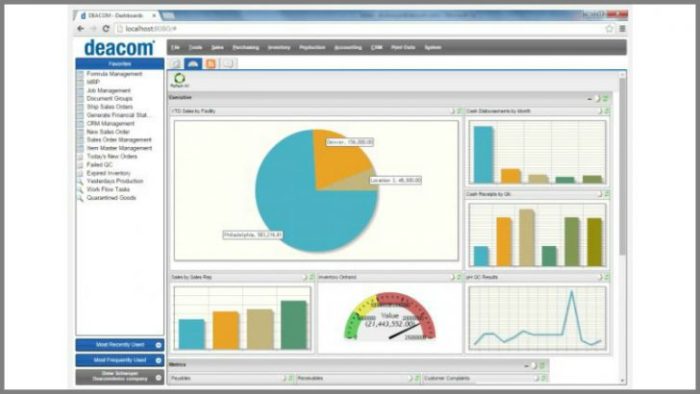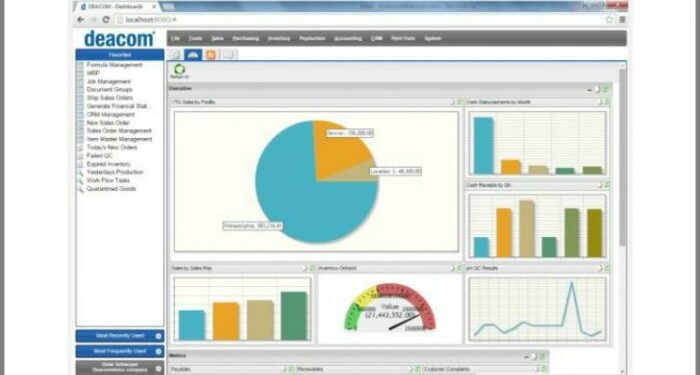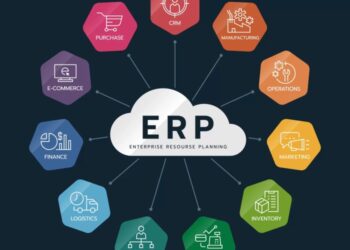Dive into the world of Deacom ERP with this detailed guide that uncovers the ins and outs of this powerful software solution. From its key features to real-world examples of its benefits, this introduction sets the stage for a deep dive into how Deacom ERP can revolutionize business processes.
As we delve further, we will explore the main modules, implementation processes, customization options, and integration strategies that make Deacom ERP a game-changer in the industry.
What is Deacom ERP?
Deacom ERP is an Enterprise Resource Planning (ERP) software solution designed to streamline and integrate business processes across an organization. It helps companies manage various functions such as inventory control, manufacturing, sales, and finance efficiently from a single platform.
Key Features of Deacom ERP
- Integrated System: Deacom ERP offers a unified platform that connects all departments within a company, eliminating the need for multiple standalone systems.
- Process Control: The software provides tools to monitor and optimize workflows, ensuring smooth operations and reducing errors.
- Regulatory Compliance: Deacom ERP helps businesses adhere to industry regulations and standards through built-in compliance features.
- Scalability: The system can grow with the business, accommodating increased data volume and user requirements.
Industries Benefiting from Deacom ERP
- Manufacturing: Deacom ERP is particularly beneficial for manufacturing companies looking to improve production efficiency and inventory management.
- Distribution: Distribution companies can optimize their supply chain operations and enhance customer service using Deacom ERP's features.
- Pharmaceuticals: Deacom ERP offers functionalities tailored to pharmaceutical companies, helping them maintain compliance and traceability.
Advantages of Using Deacom ERP
- Increased Efficiency: By streamlining processes and providing real-time data access, Deacom ERP helps businesses operate more efficiently.
- Cost Savings: The software reduces operational costs by eliminating the need for multiple systems and improving resource utilization.
- Enhanced Visibility: Deacom ERP provides comprehensive insights into business operations, enabling better decision-making and strategic planning.
Key Modules of Deacom ERP
Deacom ERP offers a range of key modules that cater to various aspects of business operations, enhancing efficiency and streamlining processes.
Inventory Management
- Tracks inventory levels in real-time
- Manages stock replenishment and reordering
- Optimizes warehouse space and layout
Production Management
- Schedules production tasks and processes
- Monitors production progress and performance
- Ensures timely delivery of products
Financial Management
- Manages financial transactions and accounts
- Generates financial reports and analysis
- Handles budgeting and forecasting
Sales and CRM
- Tracks sales activities and customer interactions
- Manages customer relationships and communication
- Provides insights for sales forecasting and strategy
Human Resources
- Manages employee information and payroll
- Handles recruitment and onboarding processes
- Tracks employee performance and training
Implementation of Deacom ERP
Implementing Deacom ERP can be a complex process that requires careful planning and execution. Below, we will explore the steps involved, challenges that companies may face, tips for a successful implementation, and the importance of training employees on Deacom ERP.
Steps Involved in Implementing Deacom ERP
- Define project scope, goals, and timeline.
- Conduct a thorough business process review.
- Customize Deacom ERP to fit the specific needs of the organization.
- Migrate data from legacy systems to Deacom ERP.
- Test the system extensively to ensure functionality and accuracy.
- Train employees on how to use Deacom ERP effectively.
- Go live with the new system and provide ongoing support.
Challenges Companies May Face During Implementation
- Resistance to change from employees accustomed to existing systems.
- Data migration issues leading to inconsistencies or errors.
- Integration challenges with other software or systems.
- Unforeseen customization needs that prolong the implementation process.
Tips for a Successful Deacom ERP Implementation
- Get buy-in from key stakeholders early in the process.
- Communicate consistently with employees about the changes and expectations.
- Allocate sufficient time and resources for testing and training.
- Work closely with the Deacom ERP implementation team for guidance and support.
- Monitor progress regularly and address any issues promptly.
Importance of Training Employees on Deacom ERP
Training employees on how to use Deacom ERP effectively is crucial for maximizing the benefits of the system. Proper training ensures that users understand the features and functionalities of the software, leading to increased efficiency, accuracy, and productivity. Investing in comprehensive training programs can help employees adapt to the new system quickly and minimize disruptions during the implementation process.
Customization and Integration with Deacom ERP

Customization and integration are crucial aspects of maximizing the efficiency and effectiveness of Deacom ERP for businesses. By tailoring the system to meet specific needs and seamlessly integrating it with other platforms, companies can streamline operations and drive growth.
Customization Options in Deacom ERP
- Deacom provides a robust set of customization tools that allow users to configure the system according to their unique requirements.
- Users can customize workflows, reports, dashboards, and user interfaces to align with their specific business processes and preferences.
- Custom fields and data structures can be easily created to capture and analyze data that is relevant to the organization.
Integration Process with Third-Party Systems
- Deacom ERP offers seamless integration capabilities through APIs, web services, and middleware solutions.
- Integration with third-party systems such as CRM, e-commerce platforms, and supply chain management software can be achieved to ensure data consistency and real-time information sharing.
- The process involves mapping data fields, establishing communication protocols, and testing the integration to ensure smooth operation.
Successful Customization and Integration Strategies
- A manufacturing company customized Deacom ERP to include a unique quality control module that improved product traceability and compliance.
- An e-commerce retailer integrated Deacom ERP with their online store to automate order processing and inventory management, resulting in faster order fulfillment and reduced errors.
- By customizing reporting capabilities, a distribution company was able to generate customized sales reports that provided valuable insights for strategic decision-making.
Benefits of Tailoring Deacom ERP
- Improved efficiency and productivity by aligning the system with specific business processes.
- Enhanced data accuracy and visibility through customized data fields and reporting.
- Increased agility and competitiveness by integrating with other systems for seamless information flow.
Wrap-Up

In conclusion, Deacom ERP stands out as a versatile and customizable tool that can enhance efficiency and productivity for businesses across various industries. By understanding its functionalities and implementation best practices, companies can harness the full potential of Deacom ERP to drive growth and success.
FAQ Summary
What industries benefit from Deacom ERP?
Deacom ERP is beneficial for industries such as manufacturing, distribution, and pharmaceuticals due to its robust features tailored to streamline operations specific to these sectors.
How does Deacom ERP compare to other ERP systems?
Deacom ERP sets itself apart by offering a single-system solution that eliminates the need for third-party integrations, providing a more seamless and efficient experience for users.
What are the key modules of Deacom ERP?
Deacom ERP includes modules for inventory management, production planning, CRM, accounting, and more, all designed to optimize different aspects of business processes.
What challenges may companies face during Deacom ERP implementation?
Common challenges include resistance to change, lack of adequate training, and data migration issues, which can be mitigated through proper planning and communication.
How important is employee training on Deacom ERP?
Employee training is crucial for successful Deacom ERP implementation as it ensures that users can fully utilize the system's capabilities and maximize its benefits for the organization.








![Best Construction ERP Software [2024 Edition]](https://health.bandungnews.id/wp-content/uploads/2025/10/Top-10-Best-Construction-ERP-Software-to-Use-in-2024-1-120x86.jpg)



